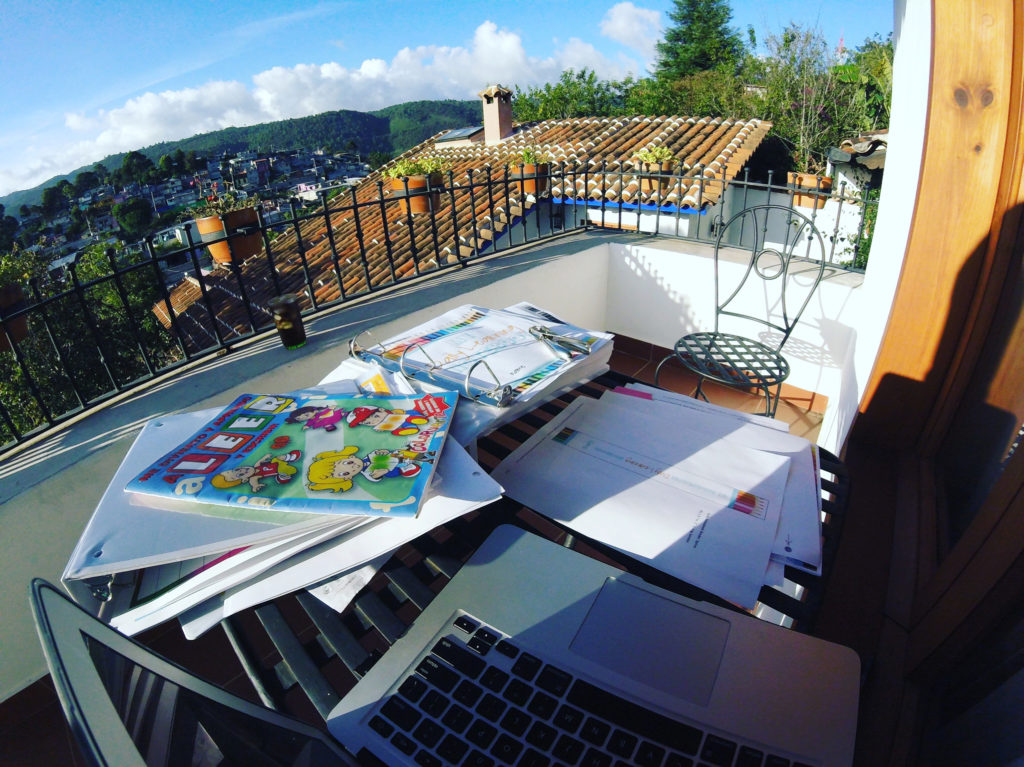Considering homeschooling your kids?
It’s a hot mess! Don’t do it! Just kidding, read on!
Some time ago, my family and I decided to go on a small adventure. Our kids’ education has always been very important to us so we had to think long and hard about how traveling would affect their schooling. What should a traveling, world-schooling, location-independent family do? How to make sure our Kindergartner, 2nd Grader and 6th Grader don’t fall behind?
In all honesty, I was worried about how this would play out. On the outside I said, “2nd grade math, I got this!” But internally I definitely had my concerns.
Here’s the good news: there’s lots of information online to guide you. The bad news: there’s LOTS OF INFORMATION online to guide you. Quite frankly, it was a bit overwhelming when we first looked into it. After hours of research sometimes I would feel even more confused than when I started.
So without further ado, here’s our list of the top 5 things to consider before homeschooling your kids:
1. Your personal level of involvement.
Are you considering being the primary teaching source? If so, will you require lesson plans and teacher guides? Or do you plan on outsourcing most of the “teaching” via online courses and/or even online tutors and virtual classrooms? The gift and the curse of homeschooling is, well, you’re in charge. Which is very empowering but at the same time the added responsibility can be daunting.
We have about an 80/20 split with us doing most of the presswork and teaching. But we do use Khan Academy and other self-guided tools to help with the process.

2. How formal will your “teaching” be?
Do you intend to essentially duplicate a traditional class and grade curriculum? Or will you fully go the “unschooling” route? There’s a sense of structure following the traditional method. Many online curriculums basically follow whatever the government’s requirements are. Unschooling completely is very liberating and allows kids to develop a sense of control for their own education. It allows the child to learn at their own pace, many times this leads to a child who’s more interested in the material. (By the way, make sure you check with your State’s/Country’s legal requirements for withdrawing your child(ren) out of a formal school. In our State of California, the requirements are not very stringent and there’s plenty of advice on how to make sure you’re doing it right.)
Our family is at about a 50/50 split. We’re aware of the curriculum requirements as defined by the California Board of Education and make sure they are at least up to par on the core competencies for their grades. However, instead of learning about the Boston Tea Party, our oldest chose to learn about the history of the Mayan civilization. Further, he learned not through a text book but by visiting actual Mayan ruins. No big deal!
3. Your financial commitment.
As mentioned earlier, there are A LOT of options and styles for homeschooling out there. Are you looking to invest a few thousand dollars in your child’s homeschool curriculum? You can find that. Are you more comfortable starting out with a bunch of free printables? You can find that as well. The reality is there is a financial component to homeschooling your kid(s), even if it’s just to print material out. Understanding your finances and approach will help you avoid wasting time/money on resources that are just not what you’re looking for.
We have spent about $800 on basic school textbooks/supplies and online services. We have spent a significant amount more on Tours/Travel/Museums/Diving and “world schooling.”
4. Your level of patience.
These kids will DRIVE YOU UP THE WALL. I have a new found appreciation for the patience teachers exhibit, God bless them. Even with the best laid out plans, kids have a way of turning everything upside down, of being dismissive or just not focusing. All things that can really irate us as parents in general but become even more magnified when you’re trying to teach them how to add double digits. (REGROUP THE TENS, SOFIA! REGROUP THE TENS!!!…oh, sorry about that.)
I thought I was a patient person prior to homeschooling. But now, let’s just say I’ve taken up meditation. I say this with more truth than as joke. Your patience will be tested and it’s a good idea to start thinking about that now. How do you handle it? Can you start working on increasing it now?

5. Internet Access.
This is a subtle but important consideration. I wrote here on some of the major decisions we reversed while traveling. While traveling the world is incredible, we’ve visited many places where the internet connection is poor at best and nonexistent at worst, in spite of “wifi” being part of the reason we stayed at a particular location. You have to consider how reliant you will be on being connected in order to teach your child.
Our original plan was to be as close to 100% paperless as possible. That changed and now we carry textbooks.
You may have noticed these five considerations don’t function in a vacuum. If you’ve settled one item, it doesn’t mean you’ll never have to address it again. On the contrary, all five things work in a sort of dynamic harmony. The more you give in one regard may require you to take from another. Low patience may mean you need to spend more money on virtual tutors. Going 100% traditional curriculum may save you lots of time in figuring things out. You may be able to solve the internet problem by paying for satellite internet access but your financial investment will be higher.
The sweet spot is where you will be most comfortable from a teacher perspective, financial commitment, time devotion and internet connectivity.
The Bottom Line
Do not let not having it all worked out stop you from doing it. Invest as much time as you’d like and then push forward. Hopefully this post helps with, at the very least, settling some of the anxiousness when starting your research. What you will learn by actually doing it, not to mention the direct feedback from your kids, will be as valuable if not more than all the research and preparation in the world.